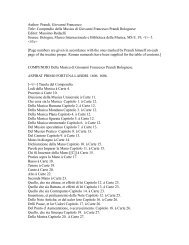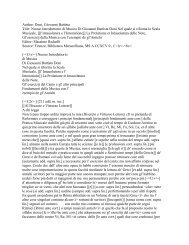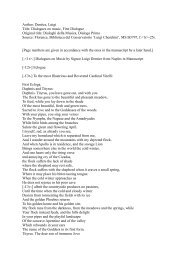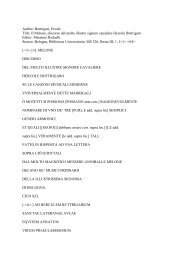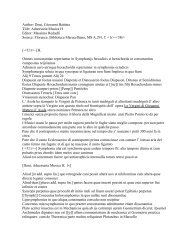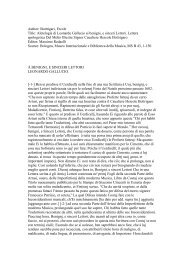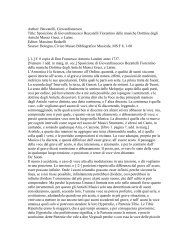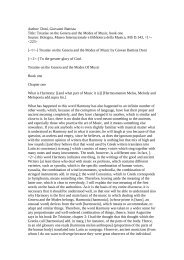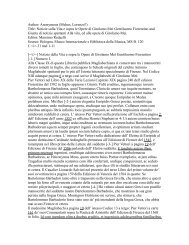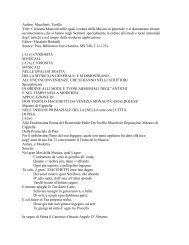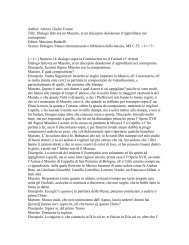Manuscripts of Italian Music Theory in Translation
Manuscripts of Italian Music Theory in Translation
Manuscripts of Italian Music Theory in Translation
Create successful ePaper yourself
Turn your PDF publications into a flip-book with our unique Google optimized e-Paper software.
if it resembles the recitative, they th<strong>in</strong>k immediately that it is <strong>of</strong> a better order. Ifsomebody says that this is the true way to compose and that <strong>Music</strong> realises its <strong>in</strong>tention,he is greatly mistaken. In fact, just as one takes away the parts <strong>of</strong> the syllogism fromLogic, or if one takes away the cues <strong>of</strong> its particular turns <strong>of</strong> phrases, one would deprivedthem <strong>of</strong> their real be<strong>in</strong>g, thus, equally, when <strong>Music</strong> is deprived <strong>of</strong> its own parts, <strong>of</strong> fuguesand other witty requirements, it becomes lack<strong>in</strong>g <strong>in</strong> what it has <strong>of</strong> good end beautiful. Totell the truth, even Cats, Dogs, Crows and other Animals <strong>of</strong> any species s<strong>in</strong>g <strong>in</strong> therecitative style <strong>in</strong> their own be<strong>in</strong>g. However, the reply comes that already In past timescomposers were forced to break the words, or, namely, their own mean<strong>in</strong>g, because <strong>of</strong> thelong span [-f.26v-] <strong>of</strong> those fugues. I ma<strong>in</strong>ta<strong>in</strong> that, if it is necessary not to break themean<strong>in</strong>g <strong>of</strong> the words, it is also duty <strong>of</strong> the composer that <strong>Music</strong> should have the occasionand the learned character to display simple and double fugues and other features whichbelong to it. If one does not accept their ideas, they reply that he writes <strong>in</strong> an oldfashionedstyle, not realis<strong>in</strong>g that a Mass by the most learned Palest<strong>in</strong>a and a work byMorales is worth more that all that they can write <strong>in</strong> the span <strong>of</strong> their life. I swear that,hav<strong>in</strong>g been a pr<strong>of</strong>essional musician all over Italy, and be<strong>in</strong>g almost fifty years old,sometimes I have found myself sometimes <strong>in</strong> some churches <strong>of</strong> the ma<strong>in</strong> Cities where Ihave heard this <strong>Music</strong> <strong>of</strong> theirs, which it seemed almost as if we should be danc<strong>in</strong>g aGagliarda or a saltarello, so ridiculous, silly and furnished with so little doctr<strong>in</strong>e andrespect for the rules. So much so, that I was left shocked and <strong>in</strong>credulous, s<strong>in</strong>ce <strong>in</strong>stead <strong>of</strong>provid<strong>in</strong>g a sense <strong>of</strong> devotion and majesty, they created a certa<strong>in</strong> feel<strong>in</strong>g <strong>of</strong> disda<strong>in</strong>towards the Div<strong>in</strong>e worship rather than anyth<strong>in</strong>g else, and they moved the listeners tolaughter, as if they were <strong>in</strong> front <strong>of</strong> comedies or other theatrical performances. This wassometh<strong>in</strong>g really undignified. I am not say<strong>in</strong>g that one should not write with someattractiveness, but I ma<strong>in</strong>ta<strong>in</strong> that they should be accompanied by some solid doctr<strong>in</strong>e andrespect for the Ecclesiastical rite and that they should be more Catholic <strong>in</strong> spirit. In fact,to tell the truth, it is not good that <strong>in</strong> the Churches, where people pray and thank theDiv<strong>in</strong>e majesty, one should be made listen to dance music, and this is a great sill<strong>in</strong>ess <strong>of</strong>which we, who write musical compositions, are guilty.Pupil: However, it seems to me that Your Lordship has composed this k<strong>in</strong>d <strong>of</strong> cheerfulmusic, s<strong>in</strong>ce I have sung myself some <strong>of</strong> them.Teacher: It is true that I wrote them, and I did this only because I was [-f.27r-] be<strong>in</strong>gordered that, s<strong>in</strong>ce I belonged to the ancient school <strong>of</strong> Palest<strong>in</strong>a, I was not able to use thestyle that is popular today. Moreover, I hope, with God’ s help, to be able to publish manyworks which I entitle Booklets <strong>of</strong> Compositions, where different Works for two, three,four and five voices are conta<strong>in</strong>ed, namely, Motets, Masses, Vespers and otherCompositions, which will be written <strong>in</strong> different styles, <strong>in</strong> such a way that it will be clearhow those who were go<strong>in</strong>g around say<strong>in</strong>g this th<strong>in</strong>g had been mistaken. They have toconsider that who comes out <strong>of</strong> the Roman school, is not so idiotic as these Wise menth<strong>in</strong>k, who can resist everyth<strong>in</strong>g but their own desires and wants. However, to go back toour task, which is to learn the elements which compose good <strong>Music</strong>, I would like you totell me what a fugue by contrary motion is.Pupil: It seems to me that it is the one that makes the part proceed by contrary motion; for<strong>in</strong>stance, if we have ut, re, mi, fa, sol, the part respond<strong>in</strong>g to it <strong>in</strong> contrary motion is la,sol, fa, mi, re, as one can see from the Sixth Table.Teacher: You speak well, but I would like you to provide me with the example. [signum]



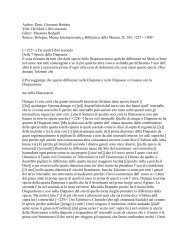
![Doni, Giovanni Battista Title: Trattato Dei Tuoni o [[Harmonie de]]](https://img.yumpu.com/45461005/1/190x245/doni-giovanni-battista-title-trattato-dei-tuoni-o-harmonie-de.jpg?quality=85)
